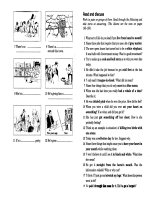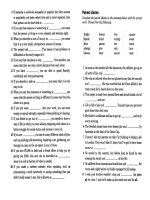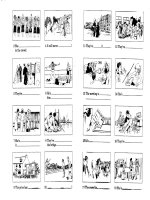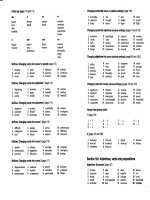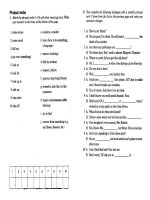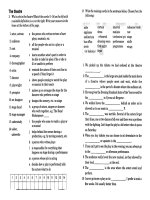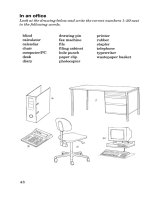new grammar practice pre int with key phần 9 ppt
Bạn đang xem bản rút gọn của tài liệu. Xem và tải ngay bản đầy đủ của tài liệu tại đây (99.73 KB, 23 trang )
Prepositions
13 The bank clerk stood (against/towards) the wall.
14 We waited (down/under) a tree.
15 1 put my suitcase (on top of/over) the wardrobe.
92 Prepositions of position and movement
Check
Use the most suitable prepositions from Exercises 89, 90, and 91 to complete
these sentences. Sometimes more than one answer is possible.
1 The dog ran ., round
t
,. the tree five or six times.
2 We flew slowly the suburbs of Paris.
3 I moved the baby the fire.
4 The police ran the crowd and arrested a young man.
5 If you put some money here, the machine will start.
6 They had nowhere to stay so they slept a bridge.
7 The town hall is the library and the museum.
8 We watched the soldiers as they walked our house on
their way to the ship.
9 They ran out of the dressing-room the football pitch.
10 London is the south-east of England.
11 The dog stood the door and waited.
12 They walked hand-in-hand the side of the canal.
13 I didn't want my mother to see her present, so 1 held it
my back.
14 The cat jumped my arms and ran away.
15 I threw the stone the sea.
16 The bottles fell the lorry and rolled the hill.
17 It was too dark to see so he walked slowly, holding his arms
him.
18 I put a chair the door to stop anyone coming in.
19 We crawled a hole in the fence.
132
Prepositions
20 What have you got your hand?
21 The cat was sitting the cupboard, looking down at me.
22 I was frightened. I could see him walking me, with a
very angry look on his face.
23 I tied the string my waist.
24 If you are feeling sick, you should sit a chair and put
your head your knees.
25 The cat jumped out of the tree the roof of my car.
93 Certain verbs with to or at
• Some verbs are followed by to or at, and some verbs do not use a
preposition:
Listen to me!
Look at me!
She told me the news.
Practice
Write to, at or nothing to complete these sentences.
1 T sent the parcel . to her yesterday.
2 Are you going to phone your parents now?
3 What did you say them?
4 The children were terrified when he shouted them.
5 What did you tell them?
6 I took the box out of my pocket and gave it her.
7 We explained the problem the attendant.
8 I don't know why they were laughing us.
9 She caught the ball and threw it gently back me.
10 They were arrested for throwing stones the police.
133
Prepositions
PREPOSITIONS OF TIME
94 at, in, on
• at a point in time:
at four o'clock, at bedtime
• on a day or date;
on Monday, on July 6th, on your birthday
• in a period of time:
in the morning, in April, in the summer, in 1987
Notes
• at night, «( Christmas, at Raster
• on Monday, in the morning, on Monday morning
Practice
Write at, in or on to complete these sentences.
1 I'll see you .on Monday.
2 I met him the holidays.
3 I'll pick you up eight o'clock.
4 I'm going home four.
5 They came to visit us my birthday.
6 I can work the morning but I don't like working
night.
7 Did you have a good time Christmas?
8 School finishes three o'clock Thursdays.
9 We arranged to meet seven the morning.
10 We had a party the last day of the course.
11 I often go skiing winter.
12 What time do you get back Tuesday?
13 She's going to visit her parents Easter.
14 He was born 8th June 1968.
15 Stuart can come and see you lunchtime.
16 I always send my wife flowers our wedding anniversary.
17 The conference is July.
134
95 until
Prepositions
Our friends are staying with us until Sunday. {= They are leaving on Sunday.)
Our friends stayed with us until Sunday. ( = They left on Sunday.]
• until + the end of a period of time [past or future)
• After until we can use a time word or expression, e.g. until Monday, until the
end of the week, or we can use a clause with a subject and verb, e.g. until I
had children, until this programme finishes.
• until + present simple to talk about the future:
I'm going to watch television until this programme finishes.
• until is often shortened to till in spoken English.
Practice
Rewrite the sentences, using until.
1 We stayed at the party and we left at midnight.
We stayed at the party until midnight.
2 I'm watching this game. I'm going to stop watching it when it finishes.
I'm going to watch this game until it finishes.
3 They played on the beach. They stopped playing when it got dark.
4 Wait. Stop waiting when the bus stops.
5 I'm going to stay in bed. I'm going to get up at 11 o'clock.
6 We're looking round the shops. We're going to stop looking round when
the rain stops.
7 I lived by the sea. I moved away from there when I was fifteen.
8 I drove. I stopped driving when we got to London.
9 You should lie down. You should get up when you feel better.
10 I'm in the office. I'm going to leave here at 6 o'clock.
135
Prepositions
96 until, before, after
• before and after can be followed by a noun, pronoun, clause or gerund:
I'll see you after lunch
John arrived before me.
She phoned after the party started.
We had some coffee before starting the meeting.
Check
96a Join the sentences with before or until.
1 I should stay here. The snow stops.
/ should stay here until the snow stops.
2 I learnt to speak some Turkish. I went to Turkey.
/ learnt to speak some Turkish before I went to Turkey.
3 They stayed awake. Their daughter came home.
4 I'm going to stay here. It's time to go home.
5 I'm going to finish working. I'm sixty.
6 The meeting started. I arrived.
7 We waited. The ambulance came.
8 Are you going to carry on working at the cafe? You can find a better job.
9 I'd like to visit the Acropolis. I leave Greece.
10 He usually has a big breakfast. He goes to work.
136
Prepositions
96b In your notebook, join the phrases in the two columns using until, before or
after to make eleven sentences.
4- You must stay in bod
A I felt very tired
3 I was asleep
4 We always have a good breakfast
5 We're going to buy some new skis
6 They felt lonely
7 I have a lot of studying to do
8 Who's going to wash the dishes
9 He lived with his parents
10 1 carried on looking for my ring
11 We must walk home
a my exams start
b staying awake all night
c it gets too dark
d he was thirty
e you got better
f we go on our skiing holiday
g we go to work
h the phone work me up
i I found it
j dinner
k their children left home
Examples: 1 You must stay in bed until you get better. 1e
2 I felt very tired after staying awake all night, 2b
97 Prepositions of time
Practice
Use one of these words to complete the sentences below.
during after
through between from
before
in
1 I waited .untill., nine o'clock and then went home.
2 If you come seven, we'll catch the bus that leaves at 7.05.
3 Will you come and see me a week or two?
4 the children left, the house was very quiet.
5 the holidays, we played tennis and did a lot of swimming.
6 I can't remember when we left the cinema: 1 think it was
ten and half-past.
7 I was ill January to March.
8 We worked all the holidays to finish painting the boat.
137
Phrasal Verbs
A phrasal verb is formed when a preposition (up, down, in, etc) or an adverb
{away, back, etc) is added to a verb to produce a new verb with a different
meaning:
/ get up at eight o'clock.
We'll pick you up outside the station.
The plane took off very quickly.
The meaning of a phrasal verb can be similar to the original verb:
The car slowed down and then stopped. (= similar meaning to slow)
- or it can be completely different to the original:
I'm going to give up smoking. (= different meaning to give)
98 Some common phrasal verbs
Practice
wake up
stand up
look after
sit down
give up
ring up
get on
Choose the correct phrasal verbs from the list above to complete these sentences.
1 The children .get up at eight o'clock to have breakfast.
2 ' !' he said. 'This is not the time for sleeping!'
3 After the crash, my legs hurt: it was very difficult to
4 ' in that chair, please/ said the doctor.
5 The bus was moving too fast and I couldn't it.
6 Mr and Mrs Smith are going to the children for an hour.
7 I'm going to smoking tomorrow.
8 I'm going to the station and ask about the trains.
138
Phrasal Verbs
99 More phrasal verbs
Practice
99a Read the dialogue and underline the phrasal verbs. Write each phrasal verb
in the infinitive in your notebook.
A: Oh hello. Nice to see you again. Did you have a good holiday? I was
planning to ring you ur to ask you about it.
B: Yes, it was lovely. We had to set off really early because the plane took
off at 6 a.m. But then we were on the beach in the sun by lunchtime.
A: Great! And what did you do most days?
B: Well, we usually slept in. It was very nice not having to get up early.
And then we stayed up late at night, going out to discos and nightclubs.
During the day, we usually lay on the beach or looked round the town.
A: And what about food?
B: Well, we didn't usually have any breakfast. By the time we got
downstairs at the hotel, they had cleared away all the breakfast things.
We tried out different restaurants for lunch and most of them were very
good. The fish was particularly nice. And we usually stayed in for dinner
at the hotel.
A: So what did you like best?
B: I liked everything - the beaches, the weather, the food, the night life, the
people. I'd like to go back again next year so I'm saving up for it already.
People book very early for that area so I must fix it up after the New
Year. If I carry on saving for a few months, I'll have enough money.
99b Match the phrasal verbs from exercise 99a with these definitions. Copy the
definitions with the correct phrasal verb into your notebook.
1 To test something for the first time to find out whether it is good or not.
= try out
2 To rise into the air to start flying (usually a plane or a bird). = take off
3 To make the arrangements for something
4 To visit a place and look at the different parts of it
5 To stay inside somewhere, not to go out
6 To begin a journey
139
Phrasal Verbs
7 To make somewhere tidy by removing things (e.g. plates and food from a
table, toys from a floor]
8 To continue to do something
9 To get out of bed
10 To return
11 To not be in bed late at night, after bedtime
12 To not spend some of your money, but to put it away or in a bank.
13 To leave the house/hotel to go somewhere, usually for pleasure.
14 To sleep late in the morning.
15 To telephone someone
100 Phrasal verbs that don't take an object
The car broke down on the way to hospital and we had to call for
an ambulance.
Please hurry up! We're going to miss the train.
Look out! There's a car coming.
• Like other verbs, some phrasal verbs take an object:
Can you pick up that bag?
verb object
And some phrasal verbs do not take an object:
We
're setting off (no object) at 7 o'clock tomorrow morning.
verb
• Examples of phrasal verbs that don't take an object:
to break down = to stop working (when talking about machinery)
to hurry up = to move, go, do something faster
to look oat = to take care
Practice
Complete the sentences, using the phrasal verbs in the box. Put the verbs into
the correct tense and form.
get up break down set off sleep in stay in
speak up go back hurry up go out look out
140
Phrasal Verbs
1 My washing machine broke down this morning so T had to do all the
washing by hand.
2 The train leaves at 5.45 so I think we should at 5.00.
3 I'd like to tonight but I've got a lot of work to do so I
should
4 Please We're going to be late.
5 Oh good. 1 don't have to early for work tomorrow so I
can
6 I'm sorry but my hearing is not very good. Could you please ?
7 ! You're going to hit that car.
8 I had a holiday in Malaysia last year and it was beautiful. I'd love
to
101 Phrasal verbs that take an object: separable
I looked up the new words in a dictionary.
Can you put away the dishes?
I put my glasses down somewhere but I can't remember where.
They've got too much money; they should give some of it away.
I don't know the answer but I must find it out.
• Many phrasal verbs take an object: I can't pick up this bag.
• We can say:
/ can't
I can't
pick up this bag.
verb particle object
pick this bag
up.
verb
object particle
The verb and the particle can separate. The particle can go before or after
the object.
• If the object is a pronoun {her, me, it, etc.) it goes before the particle:
I can't pick it up.
NOT I can't Dick up it.
141
Phrasal Verbs
• Examples of phrasal verbs that take an object (separable):
to look up = to find the meaning of a word in a dictionary or to find some
other information in a book
to put away = to put something in its proper place, e.g. a cupboard or box
to put down = to put something on a surface, e.g. a table or the floor
to give away = to give something to someone free of charge
to find out = to find information about something
to turn on = to start a machine by putting electricity into it
to turn off = to stop a machine by stopping the supply of electricity
to work out = to solve a problem by thinking hard about it
to put off = to delay something to a later date
Practice
In your notebook, rewrite the sentences substituting the underlined words with a
phrasal verb from the box. Write the sentences
a) with the object after the verb and particle;
b) with the object between the verb and particle.
(Where the object is a pronoun, you can only put it between the verb and particle.)
look up fix up give away turn on turn off
put down ring up put away work out put off
1 I usually telephone my sister at the weekend for a chat.
/ usually ring up my sister at the weekend for a chat,
I usually ring my sister up at the weekend for a chat,
2 These clothes are too small for Andrew. 1 should give them
to someone else.
3 I don't know the meaning of this word. 1 must find it in the dictionary.
4 We should talk about this problem. Can we arrange a meeting?
5 Your room looks terrible, James. Why don't you put your clothes
into the cupboard.
6 Would you like to p_ut your bag on the floor?
7 This problem is really difficult. Could you help me solve it?
8 OK, we're ready. Would you start the machine, please?
9 Marie can't come. She wants to delay the meeting until Monday.
10 The machine is too noisy. Could you stop it working, please?
142
Phrasal Verbs
102 Phrasal verbs that take an object but do not separate
She was very ill last year but she has got over the illness now.
He takes after his father. He's got the same blonde hair and blue eyes
and the same gentle manner.
She works in the mornings but she can't live off that. She must find
a full-time job.
I came across an old photograph of you yesterday. It was taken when
you were at school.
• Some phrasal verbs do not have the object between the verb and the particle.
In these verbs, the verb and the particle cannot separate. They are
inseparable. The object can only go after the verb and the particle:
I'd like to go out tonight. Can you look after the children? (to look after = to
take care of someone or something)
verb particle object
We cannot say: Can you. look the children after?
• When the object is a pronoun, it goes after the phrasal verb in the same way:
Can you. look after them?
• Examples of phrasal verbs that take an object but do not separate:
to get over = to recover from something, e.g. an illness, the death of a relative
or friend, etc. That is, to get better after something bad happens to you
to take after = to look or behave like a parent (or older relative)
to live off = to get money from something to pay for everything you need to
live, e.g. food, clothes, transport, etc.
to come across = to find something or meet someone by chance
Practice
Complete the sentences with a verb from the box. Put the verb into the correct
tense form.
take after
look round
come across
get over
live on
look after
1 He was very unhappy after his girlfriend left him but T think he is
starting to . get over it now.
2 We're going on holiday next month. We must find someone to
the cat and the plants.
3 T know you've seen the new part of the town but you should
the old part - it's very interesting.
143
Phrasal Verbs
4 We were on our way to college when we some
dancers. They were doing a beautiful dance in the street.
5 He's very good at sport and his mother is, too. He
her.
6 She loves acting but she can't the money she earns
from it. She has to do other jobs.
144
Test 1
Part A
PartB
Circle the correct words to complete the sentences
1 I talked to [he/him] yesterday.
2 I cut [me/myself) when I was shaving.
3 I hope you enjoyed [yourself/you) today.
4 Do you like {your/yours) new teacher?
5 I think that table is (oar/oars).
6 The company has decided to move [it's/Us] main office.
7 Mark won the [men's/mens') swimming championship last year.
8 Are you going to the {engineer's/engineers') conference?
9 Have they sent (we/us) an invitation?
10 If you can't find the book, you can borrow (my/mine).
SCORING
10 points: Give yourself a point for each correct answer Score
Write a/an, the, some, or any to complete these sentences.
1 I'm reading very interesting book at the moment.
2 I'd like information about your language course, please.
3 Could you answer telephone, please?
4 There weren't letters for you this morning.
5 Would you like coffee?
6 Are there good restaurants near here?
7 I'd love to be astronaut.
8 Maurizio plays piano really well.
9 They were the first people to fly non-stop round world
in a balloon.
10 Listen! I've got good news for you.
SCORING
10 points: Give yourself a point for each correct answer. Score \_j
145
PartC
Write a/an or the if necessary.
My sister Claire lives in
1
small stone house in
i
village in
J
Scotland.
4
house is quite old, and it
has
s
beautiful view of
6
sea. Claire is
7
writer, so she is able to work at
s
home. Her
husband Ian teaches
v
philosophy at
l0
Edinburgh
University, which is
n
oldest university in Scotland. Ian comes
from
]?
- USA, and they usually go there once
l3
year to visit his family. Claire and Ian have
14
daughter, Jessica,
who is not yet old enough to go to
15
school.
SCORING
15 points: Give yourself a point for each correct answer. Score Q
PartD
Find the mistake in each sentence and rewrite the sentence correctly.
1 There are a lot people in the street.
2 Anyone's stolen my wallet!
3 Hurry up! We haven't got many time.
4 Are you more tall than I am?
5 if I take that job, I'll have fewer money but more time.
6 My new manager is friendlier the old one.
7 This summer is hotter as last summer.
146
Testi
Part A
PartB
Circle the correct words to complete the sentences
1 I talked to [he/him] yesterday.
2 I cut (me/myself) when I was shaving.
3 I hope you enjoyed [yourself/you] today.
4 Do you like {your/yours} new teacher?
5 T think that table is (our/ours).
6 The company has decided to move (it's/its) main office.
7 Mark won the [men's/mens') swimming championship last year.
8 Are you going to the [engineer's/engineers') conference?
9 Have they sent [we/us) an invitation?
10 If you can't find the book, you can borrow (my/mine).
SCORING
10 points: Give yourself a point for each correct answer. Score
Write a/an, the, some, or any to complete these sentences.
1 I'm reading very interesting book at the moment.
2 T'd like information about your language course, please.
3 Could you answer telephone, please?
4 There weren't letters for you this morning.
5 Would you like coffee?
6 Are there good restaurants near here?
7 I'd love to be astronaut.
8 Maurizio plays piano really well.
9 They were the first people to fly non-stop round world
in a balloon.
10 Listen! I've got good news for you.
SCORING
10 points; Give yourself a point for each correct answer. Score [_]
Part C
Write a/an or the if necessary.
My sister Claire lives in ' small stone house in
2
village in
i
Scotland.
4
house is quite old, and it
has
5
beautiful view of
6
sea. Claire is
7
writer, so she is able to work at
s
home. Her
husband Ian teaches
9
philosophy at
10
Edinburgh
University, which is
u
oldest university in Scotland. Ian comes
from
l2
USA, and they usually go there once
13
year to visit his family. Claire and Ian have
14
daughter, Jessica,
who is not yet old enough to go to
15
school.
SCORING
15 points: Give yourself a point fur each correct answer. Score \_\
PartD
Find the mistake in each sentence and rewrite the sentence correctly.
1 There are a lot people in the street.
2 Anyone's stolen my wallet!
3 Hurry up! We haven't got many time.
4 Are you more tall than I am?
5 If I take that job, I'll have fewer money but more time.
6 My new manager is friendlier the old one.
7 This summer is hotter as last summer.
146
8 Which is highest mountain in your country?
9 This test isn't as difficult the last one we did.
10 We were too tired get to the top of the mountain.
11 That film was really bored.
12 Well done! You have all worked very hardly.
13 Please could you drive more careful?
14 Have you finished your journey, or do you have to travel more far?
15 This is the worse road in the country.
SCORING
15 points: Give yourself a point for each correct answer Score LJ
TOTAL SCORE
Maximum 50 points. Add up your score. Total Score \_J
147
Test 2
Part A
PartB
Circle the correct words to complete the sentences.
1 Most mornings, I [get up/am getting up) at 6.30.
2 Where (do you work/are you working) at the moment?
3 I don't understand what this word {means/is meaning].
4 Who {you saw/did you see) at the conference last week?
5 The taxi (arrives/'arrived) five minutes ago.
6 I {lived/have lived) in Brazil since 1998.
7 We've been waiting for you (for/since) half an hour.
8 Look at that plane! It (will/is going to) crash.
9 The letters (are/were) posted yesterday.
10 She (uses/used) to be a dancer, but now she works in a bank.
SCORING
10 points: Give yourself a point for each correct answer. Score
Complete the short answers.
1 Are you going to the concert? Yes
2 Does your father know about this? No,
3 Ts your sister learning Spanish? Yes
4 Do I write clearly enough? Yes
5 Was the sun shining when you left home? No,
6 Did the students enjoy the lecture? Yes,
7 Were the cats fighting when you got up? Yes,
8 Am I seeing the dentist tomorrow? No,
9 Are you and Jo moving house? Yes,
10 Did you hear about Tom? No,
SCORING
10 points: Give yourself a point for each correct answer. Score
PartC
PartD
Complete the conversation on a separate sheet of paper, putting the verbs into
the correct tense and form and adding all the other words you need.
ANDY: Hello,
Liz. I / not / see / you / a
long time.
How /
you?
LIZ: Fine, thanks. What about you? What / you / do / these days?
ANDY:
At /
moment
/ I
work
/ my
parents' restaurant,
but
yesterday
I /
have / job / interview with a law firm.
LIZ: Great! How / it / go? /
ANDY: Well, unfortunately,
I / a
little late.
LIZ: Why?
ANDY: Well,
my
watch
/
steal
/
last week, when
/ i
swim.
LIZ: Oh, dear. And / they / ask / you / many difficult questions?
ANDY:
Yes, but I /
think
1 / do / OK.
LIZ: So / they / offer you / job?
ANDY:
1 / not /
hear
/ yet.
They
/
tell
me
tomorrow.
LIZ: Well, good luck.
SCORING
20 points. Take off a point for each mistake. Score [_\
Put the verbs in brackets into the correct tense and form to complete the sentences.
1 I'm afraid I can't come to your party. My boss to dinner, (come)
2 The plane too low when it crashed into a mountain, (fly)
3 Simon is a journalist now, but he an athlete, (be)
4 for me! (not/wait)
5 Coffee in the mountains, (grow)
6 the report yet? (you/finish)
7 Goodbye. I you tomorrow, (see)
8 I for twelve hours last night, (sleep)
9 We a new car. (just/buy)
10 The new Pope yesterday, (choose)
SCORING
10 points: Give yourself a point for each correct answer. Score \_\
TOTAL SCORE
Maximum 50 points. Add up your score. Total Score | |
Test 3
Part A
PartB
Circle the correct words to complete the sentences.
1 She [won't/wouldn't) have all these problems if she was more efficient.
2 If it {rains/rained), we'll go by bus.
3 Where [will/would) you live if you could choose?
4 The boss always [gets/got) angry if people are late for work.
5 Felipe {can't/'couldn't) speak any English when I first met him.
6 You look tired. You [might/should) go to bed.
7 {Must/Can) you close the door, please?
8 I think it [can/may) rain tomorrow.
9 Our car broke down so we {had to/must) take a taxi.
10 You [don't have to/mustn't) tell anyone - it's a secret.
SCORING
10 points: Give yourself a point for each correct answer. Score \_\
Put the verb into either the gerund or the infinitive with to form.
1 Do you enjoy ? (cook)
2 I've decided a new job. (look for)
3 Are you interested in this report? (read)
4 He borrowed my camera without me. (ask)
5 I've bought this new suit for my interview, (wear)
6 is a very exciting sport, (ski)
7 You have to take an exam the course, (pass)
8 Thank you for us to your party, (invite)
9 Have they finished the new road? (build)
10 The children refused to bed. (go)
SCORING
10 points: Give yourself a point for each correct answer. Score [_]
Part C
Write these sentences in reported speech, using the words in brackets. Change
tenses and pronouns where necessary.
1 'I will look at the car this afternoon.' (The mechanic says)
2 'I'm a dentist.' (She said)
3 'We aren't going to sell our house.' (They say)
4 'Your passport is out of date, Mr Smith.' (The officer told)
5 'I'm waiting to see the doctor.' (The woman said)
6 'I love you, Anna.' (He told)
7 'My mother's coming to sec me.' (Mary says)
8 I'm looking for my sister.' (The boy said)
9 'You play the piano very well, Leo.' (The teacher told)
10 'We're having a wonderful holiday.' (They said)
SCORING
10 points: Give yourself a point for each correct answer. Score
PartD
Find the mistake in each sentence and rewrite the sentence correctly.
1 Have you given to your friend the money?
2 We go often to the beach in the summer.
3 I took an umbrella so it was raining.
4 Both Jenny and Sue don't have the right qualifications.
5 Like you fishing?
6 Why they did leave?
7 'I don't like doing tests.' 'Nor I don't.'
8 'Is he going to give a long speech?' 'I don't hope so.'
9 That's the woman who she has just started working here.
10 These are the earrings that my aunt bought them for me.
SCORING
10 points: Give yourself a point for each correct answer. Score


